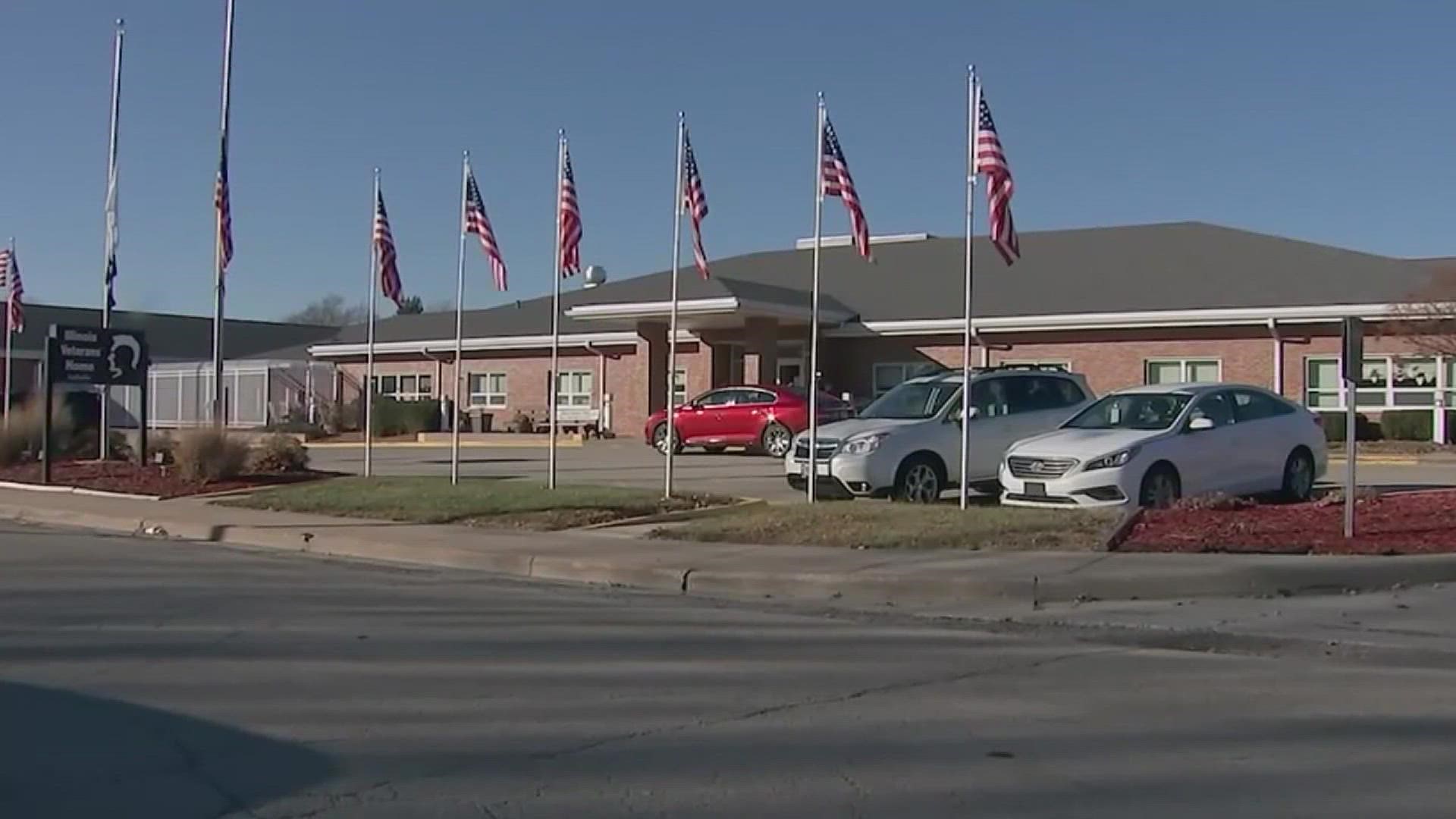LASALLE, Ill. — In late 2020, a COVID-19 outbreak at LaSalle Veterans Home infected over 100 veterans and killed dozens.
Now, families of 27 vets argue the outbreak was preventable and are suing the state, the Illinois Department of Veterans Affairs, LaSalle Veterans Home and several other administrative, medical and nursing staff at the long-term care facility for their deaths.
Lindsay Lamb lost her grandfather due to the outbreak.
"He was a loving, gentle, caring man who did not deserve to die like this," Lamb said, "We still as a family struggle every day with it."
According to court documents, lawyers on behalf of the families allege LaSalle Veterans Home failed to follow COVID-19 safety protocols.
Some of the allegations in the lawsuit say various LaSalle employees had attended an off-site party just days before the outbreak, management instructed staff to come to work and provide residents care despite knowledge of COVID-19 symptoms and veterans found positive for the virus were not isolated from other residents to prevent further spread.
It's what is most upsetting to family members like Jill Funfsinn.
"You go there and see these proud men with their pictures hanging on the walls and you look inside, and they're just so vulnerable laying in their beds. The lack of education and negligence makes me most upset," Funfsinn said, "They were very nice to my grandpa, but they definitely weren't doing what they needed to keep him safe."
“The families' hope in bringing these lawsuits is to effectuate change and garner the attention of the people in power to prevent a tragedy like this from happening again,” one of the lawyers on behalf of the families, Steven Levin, said. "It is time for the state of Illinois to finally be accountable and make our veterans' homes a model for the nation rather than a poster child for how not to treat those who have given our nation so much."
On Nov. 1, 2020, the home notified the IDVA that two vets and two staff members tested positive for COVID-19. Within a week, 60 vets and 43 staff members tested positive, and veteran deaths continued to climb in the home over the next month, according to an Illinois Department of Human Services investigation.
By December 2020, 108 residents and 105 employees tested positive, resulting in the death of 35 veterans. As of March 2, 2021, 36 vets died due to COVID-19, and 109 vets and 116 employees tested positive.
John and Laura Lundquist lost their father. John saying his dad was otherwise healthy and mentally sound.
"He was there in his mind, cognitively, fully. We didn't have to visit with him in a decreased capacity and his life was cut short and these circumstances are some that will never be resolved, that those years were taken," Lundquist said.
The siblings are two of many that feel it was the lack of care and focus of staff that resulted in their family members getting sick. Even more upsetting to most of them is the fact their loved ones died alone due to COVID-19 procedures that kept family and friends out of the facility.
“Many of these veterans died alone, suffering from air hunger and respiratory failure," Levin said. "It is true human suffering to be unable to breathe, alone and frightened, without any comfort or support.”
An Illinois Department of Public Health inspection of the veterans' home found it failed to sanitize equipment between use for three residents of five reviewed for infection control. The report recalled an incident where a nursing assistant had wheeled a monitor into a patient’s room in the COVID-19 unit, took vital signs and then wheeled the same monitor across the hall to other patients without disinfecting.
According to the report, management told a nurse to “wipe down the monitor and equipment when done, but not in between since they are all COVID positive,” when staff should have been sanitizing equipment between residents both inside and outside the COVID-19 unit.
“My dad died before he should have," plaintiff David Liesse said. Liesse's father, Jerome, was a resident at LaSalle and tested positive for the virus just days before dying. Jerome was a World War II veteran.
"Someone had to bring COVID into his room, and it was not the families," Liesse said. "It didn’t jump through the window."
The Illinois Department of Human Services investigation declared that the Department of Veterans Affairs’ lack of COVID-19 preparation contributed to the scope of the outbreak at the home, and failures in communication between the home and IDVA leadership also contributed to a delayed response to the outbreak.
The investigation made the following conclusions:
- The lack of a comprehensive COVID-19 plan at the long-term care facility was a significant factor in its failure to contain the virus. Staff were confused about the appropriate course of action during the outbreak, and therefore, operations were ineffective, reactive and chaotic. Many of the staff at the home treated the virus like the flu and did not comply with protocols like face masks.
- The home’s leadership failed to communicate, train and educate employees on the dangers of COVID-19 and precautions required to minor and control the virus.
- The home did not have a coronavirus task force or committee for which leadership determined and designated responsibilities necessary for managing and monitoring the virus.
- IDVA’s executive leadership team contributed to the home’s failed COVID-19 response by giving too many responsibilities to one individual, failing to delegate and assign clear responsibilities, failing to learn from outbreaks at long-term care facilities, failing to effectively communicate and failing to identify, seek or accept external resources to assist in outbreak response.
Read the Department of Human Services' 50-page investigation summary:

